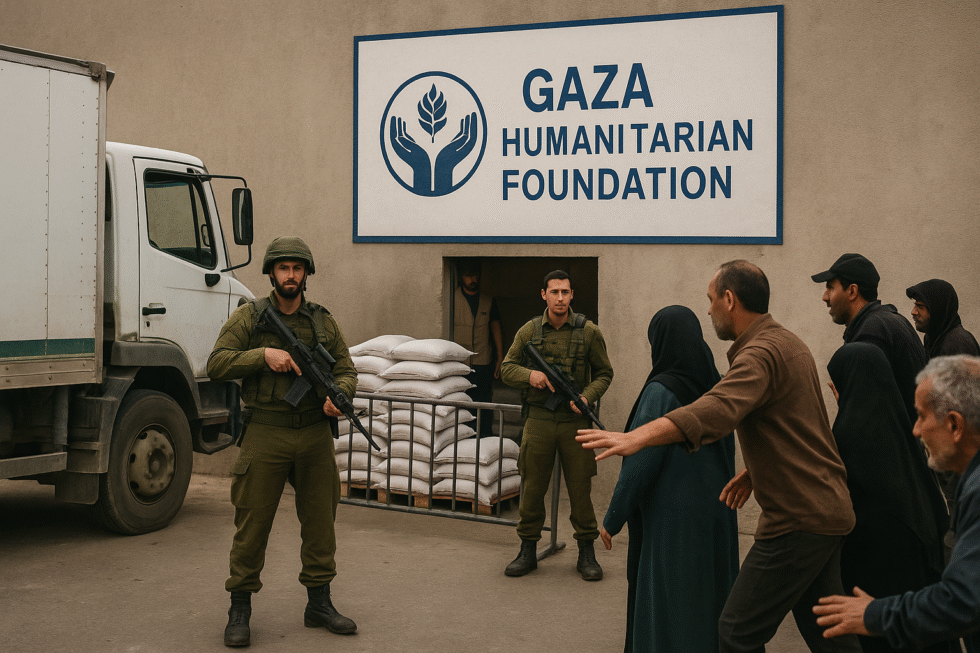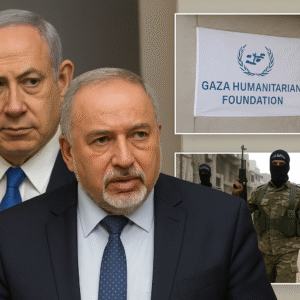How the U.S. and Israel are Weaponizing Gaza’s Humanitarian Aid

On June 27, the government media office of the Gaza Strip expressed “deep concern and condemnation” over the discovery of narcotics embedded inside flour bags distributed by the Gaza Humanitarian Foundation (GHF).
Days prior, pictures began surfacing online, taken by Gazans, showing pills inside the flour being retrieved from aid distribution sites administered by the GHF.
The recent discovery, coupled with repeated deadly incidents involving aid-seekers, has ignited outrage across the humanitarian sector and drawn sharp rebuke from international watchdogs.
As Gaza faces what the UN has frequently referred to as a man-made famine, revelations that aid may be weaponized deepen fears that the GHF is not only failing in its mission—but complicit, or even aiding in the ongoing genocide.
A U.S.- and Israeli-Backed Organization Born in Controversy
The Gaza Humanitarian Foundation was founded in February of this year. Based in Delaware, the organization is endorsed by the governments of the United States and Israel.
The GHF was launched after Israel blocked the return of UNRWA, the primary aid distributor in Gaza for decades, accusing it of bias and ties to Hamas. It was formed as an Israeli-backed alternative, allegedly to alleviate humanitarian concerns regarding aid distribution and Israel’s siege on the Gaza Strip.
Israeli officials throughout last year worked with private contractors from the U.S., including former CIA agent Philip Reilly, to lay the groundwork and plans for the GHF. The organization’s first appointed director was Jake Woods, a former U.S. Marine sniper and co-founder of Team Rubicon, an international NGO specializing in disaster relief.
Unlike UN agencies bound by international oversight, the GHF operates under a privatized and militarized model with little transparency or independent monitoring. Even early on, controversy surrounded the circumstances and operations of the GHF. Before the group even began its operations in Gaza, Jake Woods resigned.
Woods explained that while he initially believed the GHF could “feed hungry people, address security concerns about diversion, and complement the work of longstanding NGOs,” it would be impossible to carry out the mission while remaining true to core humanitarian principles—humanity, neutrality, impartiality, and independence—which he said he “will not abandon.”
Since GHF operations began in Rafah from May 26, 2025, thousands of Palestinians have been killed or wounded by contractors hired by the GHF as they approached its distribution sites in Gaza. The contractors include both American private security contractors hired by the GHF and the IDF.
According to the Gaza Health Ministry, over 700 Palestinians have been killed and approximately 5,000 injured in these incidents as of July 9, 2025.
Kill Zones and Drug-Laced Aid: Eyewitness Accounts and Evidence
According to interviews conducted by Haaretz, Israeli soldiers described “Operation Salted Fish” as a protocol for opening fire on civilians approaching GHF aid sites. “It was like playing red light, green light—but with live rounds,” a soldier admitted anonymously.
The phrase was reportedly used internally to dehumanize desperate crowds and normalize lethal force under the guise of crowd control. “It’s a killing field,” another Israeli soldier admitted.
“Where I was stationed, between one and five people were killed every day. They’re treated like a hostile force—no crowd-control measures, no tear gas—just live fire with everything imaginable: heavy machine guns, grenade launchers, mortars. Then, once the center opens, the shooting stops, and they know they can approach. Our form of communication is gunfire.”
The GHF’s intentions and operations came under increased scrutiny when the “humanitarian aid” in Gaza—particularly flour bags—were found to be laced with oxycodone. While at least four testimonies and pieces of evidence showed narcotics in the form of pills in the flour, the possibility has been raised that the pills were ground up and are now blended with the flour, suggesting the incident could be even more widespread.
Medical professionals in Gaza, including pharmacists like Omar Hamad and Dr. Khalil Mazen Abu Nada, have described the incident as “the most despicable form of genocide” and a tactic meant to “obliterate our societal awareness.”
The Gaza Government Media Office denounced it as a “heinous crime” and accused Israel of using “drugs as a soft weapon in a dirty war” aimed at spreading addiction and destroying the Palestinian social fabric from within.
Oxycodone in particular, according to the NCBI StatPearls entry on opioid toxicity, “when excessive” and “unopposed” can lead “to decreased respiratory effort and, potentially, death.” A systematic review from NCBI PMC outlines how respiratory depression during opioid overdose can lead to cerebral hypoxia and long-term brain injury.
With Gaza’s healthcare system completely overwhelmed by the ongoing war, the 16-year-long blockade of the enclave, and the intentional targeting of hospitals and medical facilities by the IDF, the introduction of drugs into distributed aid would only further collapse any remaining fragments of Gaza’s pre-war healthcare infrastructure.
A Militarized Aid Group or a Humanitarian Cover for Control?
As the death toll rises and faith in international aid erodes, many are left asking not just how the GHF was allowed to operate—but how long the global community will remain silent as food becomes a weapon of war and a tool of genocide once more.
Over 170 NGOs, charities, and other foundations have called for the GHF to be shut down, including organizations like Save the Children and Oxfam, citing concerns that it has become a tool of military control rather than a conduit for impartial aid.
Critics argue that the GHF’s operations—which have coincided with deadly Israeli military activity at distribution points and manipulation of aid supplies—have undermined the core tenets of humanitarianism.
As calls for accountability grow louder and evidence continues to surface, the foundation’s future—and the integrity of aid delivery in Gaza—hang in the balance.
If you value our journalism…
TMJ News is committed to remaining an independent, reader-funded news platform. A small donation from our valuable readers like you keeps us running so that we can keep our reporting open to all! We’ve launched a fundraising campaign to raise the $10,000 we need to meet our publishing costs this year, and it’d mean the world to us if you’d make a monthly or one-time donation to help. If you value what we publish and agree that our world needs alternative voices like ours in the media, please give what you can today.










